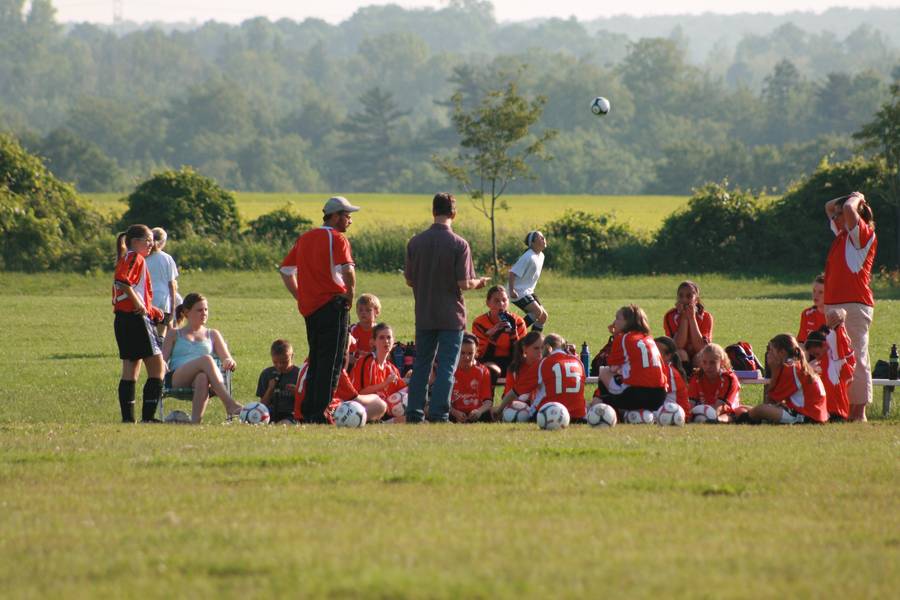
Despite being an enthusiastic volunteer in junior grassroots football myself, I am regularly astounded and a little bit humbled by the levels of dedication of others involved in providing the very best experience for our young players.
Every Saturday and Sunday morning, long before the first excited youngsters arrive for their matches an army of dedicated volunteers across Britain put themselves to work. On matchdays volunteers are often the first to arrive and the last to leave. They set up the pitches, put up the nets, ensure equipment is in place and sometimes even step in to referee or run the line if needed. Yet these everyday volunteers rarely receive the recognition they deserve for keeping the game alive at its most fundamental level.
I was speaking to Kevin, the secretary of our club who has been fulfilling the role for over 15 years and his story is a familiar one. "I started when my son joined the under-8s," he explains, "and even though he's grown up and moved on, I couldn't imagine my weekends without it now." Like many
volunteers, his commitment goes far beyond simple administration duties. At different times he can be anything from treasurer, groundskeeper, kit washer and sometimes even emergency referee, roles that consume between 12-20 hours of his time each week.
It’s estimated that grassroots football in England alone relies on roughly 400,000 volunteers who collectively contribute to keep the game thriving. Recent research from the FA reveals that these volunteers contribute over 150 million hours annually to keep local football alive, equivalent to £1.2 billion in economic value, a staggering figure that underscores just how much our game depends on their dedication.
Many grassroots football clubs operate on shoestring budgets, and without the tireless work of volunteers who raise funds and manage resources, the costs associated with running a club would be overwhelming. Whether it’s selling raffle tickets, organising fundraising events or securing sponsorship, our volunteers play a vital role in ensuring that clubs can continue to operate.
Behind every successful junior football club there are dedicated committee members wrestling with modern challenges that would test any business professional. They navigate safeguarding regulations, manage ever tighter budgets in tough economic times and handle the increasing demands of league administration. Many do this while holding down full time jobs and managing their own family commitments.
The modern volunteer faces challenges that would have been unimaginable a generation ago. Today's grassroots football requires expertise in digital systems, social media management, and safeguarding protocols. The recent shift to online player registration systems and digital match reporting has added another layer of complexity to volunteer roles. Yet somehow, these dedicated individuals adapt and persist, often learning new skills well outside their comfort zones.
Kevin explained to me the evolving challenges that volunteers face. "When I first started years ago, my job was basically collecting subs and paying for pitch hire," he explains. "Now I'm dealing with online banking, gift aid declarations, grant applications, and sponsorship agreements. I probably spend more time on Excel than I do watching the football itself." Kevin's experience reflects a broader trend in grassroots football, where volunteers increasingly need professional level skills to keep clubs running. The FA's Grassroots Survey 2023 revealed that 67% of club volunteers now spend more time on administrative tasks than on actual football related activities.
Another remarkable aspect of our game is how volunteers often become unexpected mentors and role models. They demonstrate values like commitment, responsibility and community service that leave lasting impressions on young players. I know that many former junior players credit the volunteers with teaching them life lessons that proved just as valuable as their football skills.
The pandemic highlighted just how crucial these volunteers are to their communities. When football finally resumed after the lockdowns, it was volunteers who worked tirelessly to implement safety measures, reorganise fixtures and provide reassurance to worried parents. Many went above and beyond, staying in touch over the down time to maintain team morale and even organising online training sessions to keep young players engaged.
Apparently though, grassroots football is facing a growing challenge in volunteer recruitment. The average age of volunteers is increasing and some clubs are struggling to attract younger helpers. The obvious route of recruiting willing parents isn’t always productive. Some clubs are tackling this challenge head on with innovative approaches. The "Parents to Partners" scheme, pioneered by several clubs in the Midlands, introduces parents to volunteering gradually, starting with simple match day duties before progressing to more involved roles. This approach has proven successful, with many participants discovering a passion for community football they never knew they had.
Young leaders' programmes are another positive development, giving teenagers their first taste of volunteering through supervised roles like assistant coaching. These initiatives not only secure the next generation of volunteers but also provide valuable experience for CVs and university applications.
The rewards of volunteering in grassroots football are numerous, though never financial. While volunteers give a great deal of their time and energy, they often speak of the rewards they receive in return. The sense of satisfaction that comes from seeing young players grow and develop, both as footballers and as people, is a powerful motivator. Many volunteers speak of the friendships they have made through their involvement in grassroots football and the sense of belonging that comes from being part of a community with a shared purpose. For many, volunteering is an opportunity to stay connected to the sport they love and to make a positive contribution to the next generation of players.
There's something uniquely satisfying about knowing you've played a part in a child's sporting journey, whether they go on to become the next Harry Kane or simply turn out to be a decent human being.
Grassroots football volunteers don't seek the spotlight, but they deserve our recognition and support. They are the true foundation of our game and are the unsung heroes who ensure every child has the opportunity to play, learn, and fall in love with football.


















